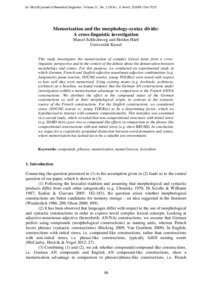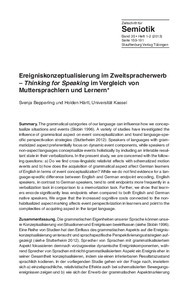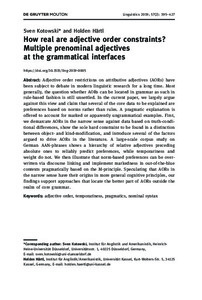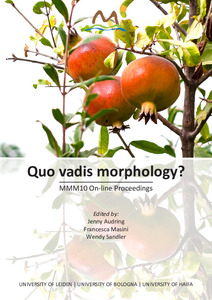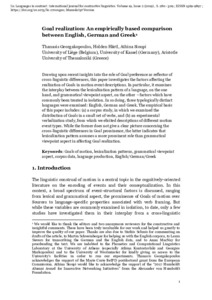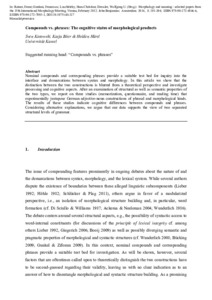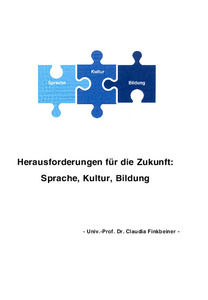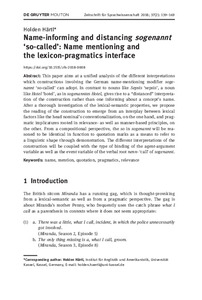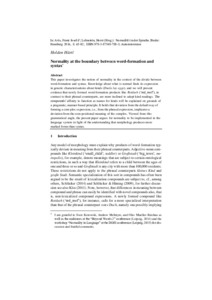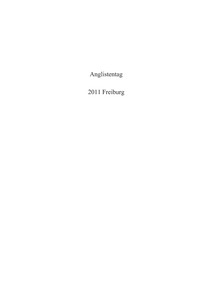Suche
Anzeige der Dokumente 1-10 von 13
Aufsatz
 Memorization and the morphology-syntax divide: A cross-linguistic investigation
Memorization and the morphology-syntax divide: A cross-linguistic investigation
(2016)
This study investigates the memorization of complex lexical items from a cross-linguistic perspective and in the context of the debate about the demarcation between morphology and syntax. For this purpose, we conducted an experimental study in which German, French and English adjective-noun/noun-adjective combinations (e.g. Jungtourist, jeune touriste, YOUNG tourist, young TOURist) were tested with respectto how well they were memorized. Using existing nouns (e.g. Architekt, architecte, architect) as a baseline, we ...
Aufsatz
 Ereigniskonzeptualisierung im Zweitspracherwerb - Thinking for Speaking im Vergleich von Muttersprachlern und Lernern
Ereigniskonzeptualisierung im Zweitspracherwerb - Thinking for Speaking im Vergleich von Muttersprachlern und Lernern
(2013)
The grammatical categories of our language can influence how we concep-tualize situations and events (Slobin 1996). A variety of studies have investigated the influence of grammatical aspect on event conceptualization and found language-specific perspectivation strategies (Stutterheim 2012): Speakers of languages with grammaticized aspect preferentially focus on dynamic event components, while speakers of non-aspect languages conceptualize events holistically by including an inferable resultant state in their ...
Aufsatz
 How real are adjective order constraints? Multiple prenominal adjectives at the grammatical interfaces
How real are adjective order constraints? Multiple prenominal adjectives at the grammatical interfaces
(2019)
Adjective order restrictions on attributive adjectives (AORs) have been subject to debate in modern linguistic research for a long time. Most generally, the question whether AORs can be located in grammar as such in rule-based fashion is still unsettled. In the current paper, we largely argue against this view and claim that several of the core data to be explained are preferences based on norms rather than rules. A pragmatic explanation is offered to account for marked or apparently ungrammatical examples. First, ...
Konferenzveröffentlichung

 The lexicalization of complex constructions: an analysis of adjective-noun combinations
The lexicalization of complex constructions: an analysis of adjective-noun combinations
(Pasithee : Open Access Electronic Publications; Library & Information Center - University of Patras, 2016)
The current paper discusses the lexicalization of complex constructions composed of an adjective and a noun. It is argued that compounds/compound-like constructions are more prone to become lexicalized than phrases/phrase-like constructions. The relationship between lexicalization and the cognitive process of memorization represents a key point of our analysis. We report evidence from psycholinguistic studies contrasting compounds/compound-like constructions to phrases/phrase-like constructions either within a single ...
Aufsatz
 Goal realization: An empirically based comparison between English, German and Greek
Goal realization: An empirically based comparison between English, German and Greek
(2018)
Drawing upon recent insights into the role of Goal preference as reflector of cross-linguistic differences, this paper investigates the factors affecting the realization of Goals in motion event descriptions. In particular, it examines the interplay between the lexicalization pattern of a language, on the one hand, and grammatical viewpoint aspect, on the other – factors which have commonly been treated in isolation. In so doing, three typologically distinct languages were examined: English, German and Greek. The ...
Teil eines Buches
 Compounds vs. phrases: The cognitive status of morphological products
Compounds vs. phrases: The cognitive status of morphological products
(John Benjamins, 2014)
Nominal compounds and corresponding phrases provide a suitable test bed for inquiry into the interface and demarcations between syntax and morphology. In this article we show that the distinction between the two constructions is blurred from a theoretical perspective and investigate processing and cognitive aspects. After an examination of structural as well as semantic properties of the two types, we report on three studies (memorization, questionnaire, and reading time) that experimentally juxtapose German ...
Buch

 Herausforderungen für die Zukunft: Sprache, Kultur, Bildung
Herausforderungen für die Zukunft: Sprache, Kultur, Bildung
(2018)
Der folgende Beitrag widmet sich drei wichtigen Themen, die große Herausforderungen für die Zukunft darstellen: Sprache, Kultur und Bildung. Diese Faktoren sind wie Puzzleteile eng miteinander verbunden und beeinflussen sich gegenseitig. Sprache und Kultur können darüber hinaus mit zwei Seiten einer Münze verglichen werden , die nicht zu trennen sind.
Aufsatz

 Name-informing and distancing sogenannt ‘so-called’: Name mentioning and the lexicon-pragmatics interface
Name-informing and distancing sogenannt ‘so-called’: Name mentioning and the lexicon-pragmatics interface
(2018)
This paper aims at a unified analysis of the different interpretations which constructions involving the German name-mentioning modifier soge-nannt‘so-called’ can adopt. In contrast to nouns like Sepsis‘sepsis’, a noun like Hotel ‘hotel’, as insogenanntes Hotel, gives rise to a “distanced” interpretation of the construction rather than one informing about a concept’s name. After a thorough investigation of the lexical-semantic properties, we propose the reading of the construction to emerge from an interplay between ...
Teil eines Buches
 Normality at the boundary between word-formation and syntax
Normality at the boundary between word-formation and syntax
(Buske, 2016)
This paper investigates the notion of normality in the context of the divide between word-formation and syntax. Knowledge about what is normal finds its expression in generic characterizations about kinds (Ducks lay eggs), and we will present evidence that newly formed word-formation products like 'Rotdach' (‘red_roof’), in contrast to their phrasal counterparts, are more inclined to adopt kind readings. The compounds’ affinity to function as names for kinds will be explained on grounds of a pragmatic, manner-based ...
Teil eines Buches
 Nominal composition and the demarcation between morphology and syntax: Grammatical, variational, and cognitive factors
Nominal composition and the demarcation between morphology and syntax: Grammatical, variational, and cognitive factors
(WVT Wissenschaftlicher Verlag Trier, 2012)
In this paper, the authors investigate nominal compounds in English and German against the background of the debate about the boundary between morphological and syntactic structure building in language. After an examination of grammatical, variational as well as functional differences between compounds and phrases, they focus on processing factors to disentangle cognitive differences between the two domains. Crucially, the authors report on three experimental studies, which are designed to reveal contrasts in the ...

